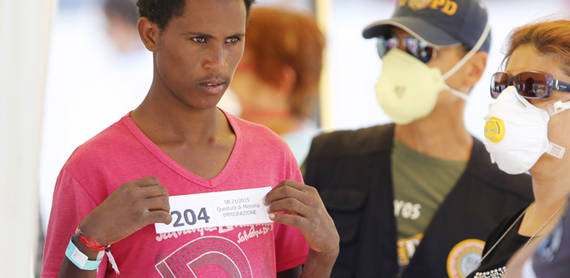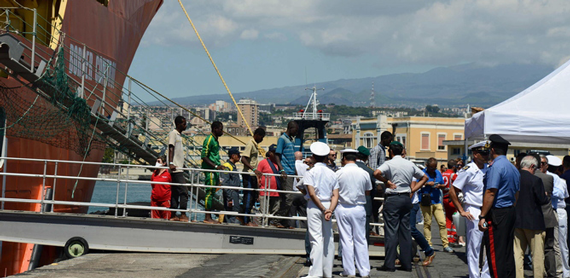A migrant is processed upon arrival in Sicily. Reuters/Antonio Parrinello
Guest post by Simon McMahon, Centre for Trust, Peace & Social Relations
For more than a decade, Sicily has been the first port of call for survivors of one of the world’s deadliest sea crossings. This year nearly 90,000 migrants have arrived there, and an estimated 2,860 people have died in the sea trying to make the journey.
At first glance, migration to the island seems to be managed in an orderly way; the new arrivals are kept behind security fences and far from the eyes of the general public. Yet in many places, confusion reigns behind the façade. As part of the authorities’ efforts to fast-track processing of arrivals, expulsion orders have been handed out to groups of people who don’t understand the implications – potentially in defiance of international law.
Pieces of paper
I recently spent three weeks in Sicily examining the dynamics of the migration crisis in the Mediterranean. I’ve been talking to people who have left behind persecution, conflict and poverty, lived through situations of horrific violence and lawlessness in Libya and survived the terrifying sea crossing.
On arrival, they are confronted with a complex and confusing bureaucratic system designed to separate “economic migrants” from refugees with a claim to international protection.
The situation is not easy for them. Many want to find a job and get on with their lives but carry with them the burden of the persecution and trauma they experienced before arriving. The lines between their economic concerns and personal safety are blurred, to say the least.
Some also took to showing me what they called their “piece of paper”: an expulsion order saying they had to leave Italy within seven days. Over recent weeks these orders have been increasingly liberally distributed. More than 100 cases were reported in Syracuse two weeks ago. More were given out in the port town of Pozzallo.
One group was given expulsion orders at a reception centre just a few days after being rescued at sea. They say they were told to sign the document without anyone explaining what it meant. People under 18 were not distinguished from adults and some of them said they had the wrong date of birth recorded.
The group was not only told to leave Italy by their own means within seven days, but also to leave the reception centre immediately. What followed was a 35km walk to the nearest town and a night sleeping in a car park until they could find a place to stay and a lawyer could see their case.
Many have now had their expulsion orders overturned. They are instead having claims for international protection processed and have been readmitted to the formal migrant reception system (although it is not uncommon for applications of this type to take years to settle).
A group who ran in to trouble off the coast of Libya arrives in Catania. EPA/Orietta Scardino
Handing out group expulsions in this arbitrary way is contrary to EU law. They appear to be being handed to people because of their nationality rather than their reasons for leaving home.
They are also primarily given to people from the poorest countries – those least likely to have the resources to continue their journey away from Sicily or to leave the country by their own efforts.
One group of people I met claimed they didn’t even know what asylum was, let alone how to apply for it. These expulsions are therefore likely to create a population of homeless and undocumented people who are unable to work and integrate or to move away.
Much talk in Europe recently has been on strengthening controls and speeding up the repatriation of migrants. But if this takes place behind security fences and out of sight, there is a risk that arbitrary deportations can continue. Migration reception facilities, in particular the EU’s new Hot Spots, need to ensure that the right to international protection is properly upheld in practice, otherwise such efforts will be unsustainable and create further problems down the line.
Originally written for ‘The Conversation’.





Comments are disabled